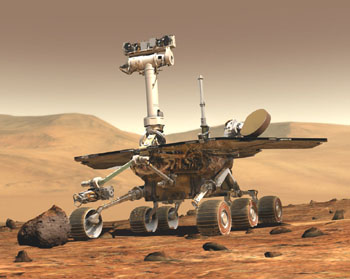![[Metroactive Features]](/features/gifs/feat468.gif)
[ Features Index | Silicon Valley | Metroactive Home | Archives ]

Biter Robots vs. Aliens Sending robots to Mars to meet up with aliens just doesn't seem like a good idea BRIAN GLASS, a Palo Alto-based NASA scientist educated at MIT, Georgia Tech and Stanford (and clearly in need of a giant wedgie), isn't insecure about eventually being outsmarted by robots. Glass' lack of concern, however, flies in the face of evidence that his own scientific adventures sharply threaten the human race's relevance as a species. Glass and his NASA team's latest baby, the Mars Analog Research and Technology Experiment (MARTE), aims to teach robots to find aliens on Mars. Biter caught up with Glass last week before he headed off to Spain (which is apparently on the way to Mars) for collaboration on the pro-robot, or probot, mission. "You're looking for very difficult information, things that are hard to find," Glass says about the tiny green men with antennae, soon to be robots' new best friends. "A machine doesn't get tired, and it can go through large amounts of data without falling asleep ... or having a seizure." Glass assures Biter that he, himself, doesn't usually have seizures while doing paperwork. He also promises that robots presently lack the wherewithal to get mad at humans for passing off all the tedious work onto them until, finally, they lash out. (He was, however, unclear about when exactly robots will learn to hate and to kill.) Glass seems totally gung-ho about furthering R2D2's evolution and turning him into HAL ("What are you doing, Dave?"). "Well, the humans are building the robots," he points out with total disregard for Karma or poetic-justice laws or lessons he should have learned from 2001: A Space Odyssey. "They are our instruments. They work for us." Sure they do. Now. But Glass and his international gang of smartypantses keep making robots más inteligente. They're working on rovers that rove unpiloted, for example. Plus, they're trying to teach robots the skill of adapting to a shifting environment. Which sucks, because the human ability to adapt is what makes us special. ("On the other hand, a robot isn't as flexible," Glass says. "They'll only do exactly what we tell them.") So there goes the one edge. Glass urges Biter not to worry about robots taking over, equivocating with, "I don't think we'll see that anytime soon." Meanwhile--back in the world of normal people who didn't go to MIT and don't have a handle on robotics, engineering and geophysics--unemployment levels are high enough that it appears humans don't even work for humans. Now the scientists are giving the few jobs humans have away. At the moment, Glass and the other probot scientists are only rehearsing the robot's theoretical ability to find E.T. on Mars. This thing in Spain is only a test run. Readers can tune in to the scientists lecturing on their progress on the web from Sept. 29 to Oct. 15 at www.robotics.nasa.gov/courses/fall2003 (San Jose State University students can get credit) and www.cab.inta.es. Glass is scheduled to lecture about "issues and challenges for robotic drilling." With luck, he'll touch on the fact that once they start drilling for aliens, robots will gain friends. They'll be that much closer to colonizing Earth via a bloody revolution fortified with the united forces of illegal immigrants and Terminators! Oh, wait, what were we talking about?
Send a letter to the editor about this story to letters@metronews.com. [ Silicon Valley | Metroactive Home | Archives ]
|
From the October 2-8, 2003 issue of Metro, Silicon Valley's Weekly Newspaper.
Copyright © Metro Publishing Inc. Metroactive is affiliated with the Boulevards Network.
For more information about the San Jose/Silicon Valley area, visit sanjose.com.